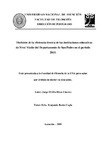Mostrar el registro sencillo del ítem
Medición de la eficiencia técnica de las instituciones educativas de Nivel Medio del Departamento de San Pedro en el periodo 2015
| dc.contributor.advisor | Barán, Benjamín | |
| dc.contributor.author | Risso Cáceres, Jorge Ovidio | |
| dc.date.accessioned | 2022-04-08T02:36:46Z | |
| dc.date.available | 2022-04-08T02:36:46Z | |
| dc.date.issued | 2019 | |
| dc.identifier.uri | http://hdl.handle.net/20.500.14066/2900 | |
| dc.description.abstract | La presente investigación propone como objetivo principal determinar el nivel de eficiencia que presentan las instituciones educativas del nivel medio del Departamento de San Pedro, aplicando para ello el Análisis Envolvente de Datos DEA (Data Envelop Analysis, por sus siglas en inglés) en su versión Inputs Orientado, dando así énfasis a los insumos, disponibles en los centros educativos. La metodología aplicada se centró en el enfoque cuantitativo, de nivel exploratorio, con diseño descriptivo – no experimental. Para ello, se utilizaron datos del año 2015, que abarcó el análisis de 105 centros de educación media del Bachillerato Científico, incluyendo a todas aquellas que reunían las condiciones propuestas por la metodología seleccionada. En el procesamiento de los datos se emplearon planillas en formato Excel especialmente diseñadas para las pretensiones del trabajo, para evidenciar el nivel de eficiencias se empleó el programa informático GAMS. Para la interpretación de las informaciones se construyeron categorías que engloban a las variables que intervienen en la investigación, de este modo se pudo constatar que las instituciones de San Pedro experimentaban una eficiencia media de 90 %. | es |
| dc.description.abstract | The present research proposes as a main objective to determine the level of efficiency presented by the educational institutions of the middle level of the Department of San Pedro, applying for this purpose the Data Envelop Analysis (Data Envelop Analysis) in its Inputs version Oriented, thus emphasizing the inputs available in educational centers. The methodology applied focused on the quantitative approach, exploratory level, with descriptive design - not experimental. For this, data from the year 2015 were used, which included the analysis of 105 secondary education centers of the Scientific Baccalaureate, including all those that met the conditions proposed by the selected methodology. In the processing of the data Excel spreadsheets specially designed for the job claims were used, to demonstrate the level of efficiencies the GAMS software was used. For the interpretation of the information, categories were built that encompass the variables involved in the investigation, thus it was found that the San Pedro institutions experienced an average efficiency of 90%. The study covered 20 of 21 districts. The findings allowed us to show, above all, that the centers have a relatively good level of efficiency and that there are conditions for those institutions considered inefficient to manage specific actions in order to increase their efficiency and improve their positioning, it was also found that there are certain common characteristics present in the institutions that achieved maximum efficiency | en |
| dc.description.sponsorship | CONACYT - Consejo Nacional de Ciencia y Tecnología | es |
| dc.language.iso | spa | es |
| dc.publisher | FF-UNA | es |
| dc.subject.classification | 9 Educación | es |
| dc.subject.other | EFICIENCIA TECNICA | es |
| dc.subject.other | EDUCACION - MEDICION | es |
| dc.subject.other | EDUCACION - NIVEL MEDIO | es |
| dc.subject.other | EDUCACION | es |
| dc.subject.other | PEDAGOGIA | es |
| dc.title | Medición de la eficiencia técnica de las instituciones educativas de Nivel Medio del Departamento de San Pedro en el periodo 2015 | es |
| dc.type | doctoral thesis | es |
| dc.description.fundingtext | PROCIENCIA | es |
| dc.relation.projectCONACYT | BECA19-140 | es |
| dc.rights.accessRights | open access | es |
| dc.subject.ocde | CIENCIAS DE LA EDUCACION | es |
| thesis.degree.discipline | Ciencias Sociales | es |
| thesis.degree.grantor | Universidad Nacional de Asunción - Facultad de Filosofía (PY) | es |
| thesis.degree.level | Doctorado | es |
| thesis.degree.name | Doctorado en Educación | es |
Ficheros en el ítem
Este ítem aparece en la(s) siguiente(s) colección(ones)
-
Tesis de Doctorado
La colección comprende las tesis de doctorado aprobadas en el marco del instrumento "Creación y fortalecimiento de programas de posgrados académicos" del Programa PROCIENCIA.

